Has India’s first family finally lost its grip on power?
Namita Singh
Sun, June 2, 2024
INDEPENDENT UK

Left to right: Priyanka Gandhi-Vadra, Sonia Gandhi and Rahul Gandhi at an election campaign rally in Rae Bareli (Reuters)
A ripple of excitement spreads through the crowd waiting outside in the 40C midday heat in this corner of Uttar Pradesh, northern India – an island in a sea of constituencies supporting Narendra Modi’s BJP.
“Rahul-ji’s helicopter has come!”, announces an audience member, not long before campaign songs start to blare from speakers and Rahul Gandhi, India’s second-most recognisable politician, steps onto the stage.
This was the scene just a couple of weeks ago in one of the last bastions of fervent support for the Gandhi-Nehru family, one of the world’s great political dynasties whose members include three Indian prime ministers. Among them is Rahul Gandhi’s great-grandfather, the first and longest-serving leader of independent India, Jawaharlal Nehru.
Yet India has changed dramatically since the time when Nehru led the Congress party, with Saturday’s exit polls indicating that Mr Modi’s Hindu nationalist alliance will take more than 350 parliamentary seats when the full results of the country’s general election are announced on Tuesday.
Congress and its allies are forecast to win barely a third of that number, making it a third election in a row where India’s grand old party has desperately underperformed. They say the BJP’s widespread abuse of government investigative agencies to harass opposition leaders and parties, including a total freeze on Congress’s bank accounts, mean this election has been neither free nor fair.
But it is also significant that cracks were already starting to show even in Rae Bareli and Amethi, two neighbouring constituencies in Uttar Pradesh that were once the safest of seats for Congress, when The Independent visited last month. For years the Rae Bareli seat was represented by Sonia Gandhi, former Congress president and wife of the assassinated former prime minister Rajiv Gandhi. She has stepped aside for a seat in India’s upper house of parliament, leaving her son Rahul to take over the constituency, and poor exit poll numbers aside, he is still expected to win here.

Rahul Gandhi waves to supporters during an election campaign public meeting in Rae Bareli (AFP)
While support for the Gandhis still seemed strong in Rae Bareli, voters in Amethi told The Independent they were questioning what Congress has to offer them given its weakened status across the country, and whether five years with a Congress MP would really make for positive change in a relatively rural and impoverished region. It gets to the heart of a question that will be picked over in the weeks to come – did Congress run an effective and positive campaign, or focus too much energy on trying to paint Modi as India’s bogeyman? And what does yet another election loss say about the future of a family that has ruled India for more than half of the last 77 years?
When Mr Gandhi does take to the stage, he is quick to go on the attack. “This election is the strangest one in the history of independent India,” he begins. “Because the BJP and [its ideological parent organisation] RSS are fighting the elections to obliterate the constitution. Their leaders have clearly said they will change the constitution of India once voted to power.”
Mr Gandhi is referencing concerns that Mr Modi, emboldened in a third term, will try to remove references from the constitution to India being a secular nation, and instead declare it a country for Hindus. Mr Modi has said he has no plans to do this, but it’s a talking point for many die-hard BJP supporters and such fears have hardly been assuaged by an aggressive election campaign full of anti-Muslim rhetoric.
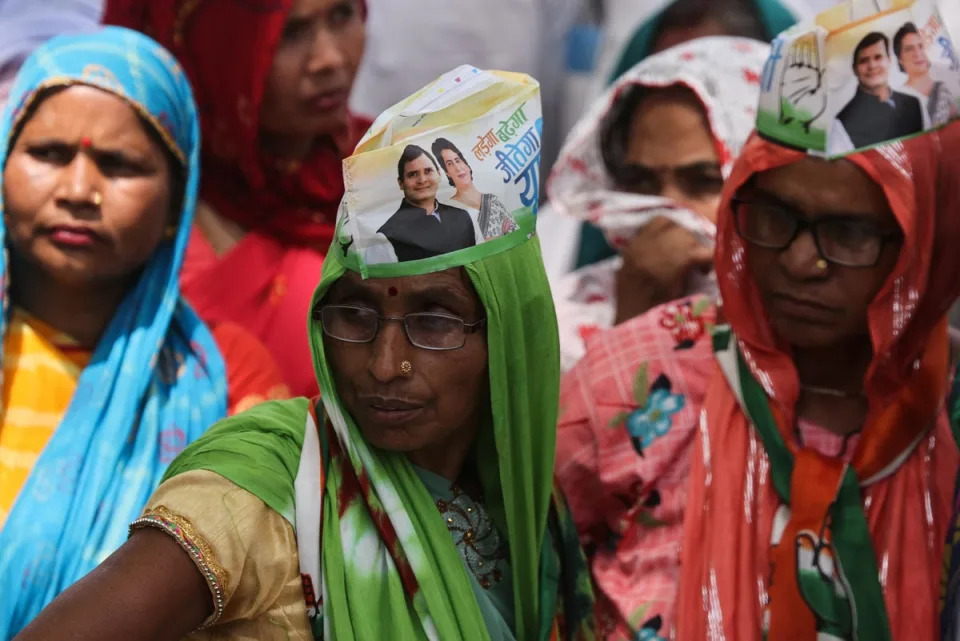
Congress party supporters in Rae Bareli (Reuters)
The Independent spoke with Mr Gandhi’s sister, Priyanka Gandhi-Vadra, who is herself a top party strategist and star campaigner. Asked what Congress had to offer voters at this election, she said: “Our pitch is very simple. Mr Modi’s policies have been extremely, they’ve actually been harmful for the poor of this country, for the farmers, for labourers [and] even for the middle class. Frankly, he has not done anything to strengthen them.
“We are saying that his policies have all been skewed towards three or four of his oligarch friends to whom he seems to be handing everything, even the nation’s assets,” she says, an apparent reference to Mr Modi’s close ties with billionaire industrialists like Mukesh Ambani and Gautam Adani, the country’s two richest men.
“And we are saying that we want to put in place a government that is focused on solving your problems and focused on strengthening you so that you can face all these problems that have multiplied under Modi’s rule.”
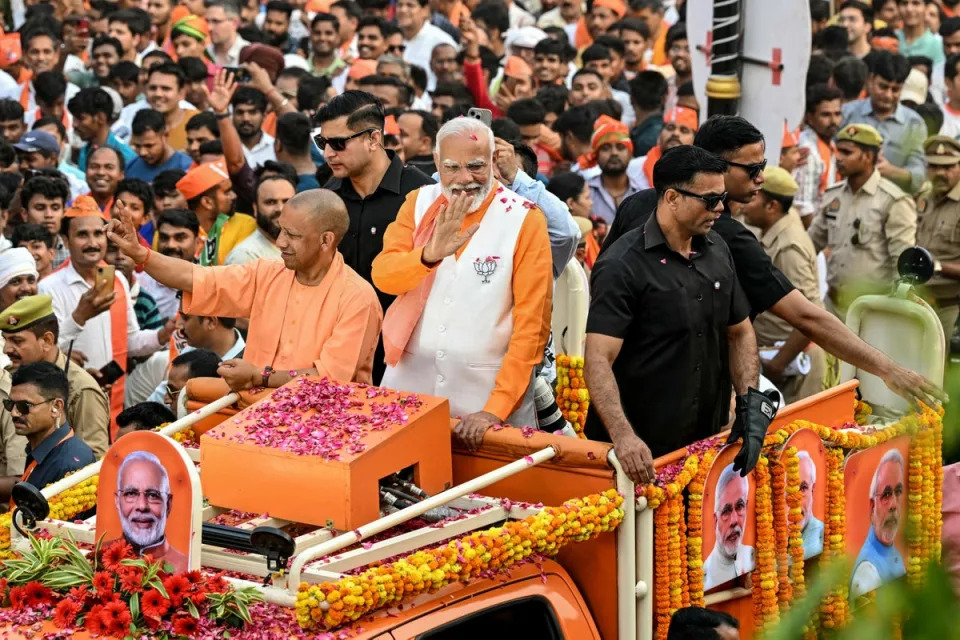
Narendra Modi with Yogi Adityanath, chief minister of Uttar Pradesh, waves to the crowd in Varanasi last month (AFP)
While most would agree that this election has been far from fair for Congress and its allies, the party is also facing criticism for an apparent inability to recover from the landslide losses of 2014 and 2019 and provide a viable alternative to Mr Modi. Sugata Srinivasaraju, journalist and author of a book on Rahul Gandhi, Strange Burdens, suggests the Gandhis have spent too much of the election preparing to defend their own roles in the party in the event that they lose.
“They are creating a ground already to say that the elections may not be so credible after all. That it is possible they are stolen. They are planting doubts with regard to the electoral processes,” he tells The Independent.
“My question is when you spent so much energy on a negative campaign, on berating Modi, you could have spent a part of that energy to positively approach your own party. What have you done concretely to reorganise your party?”
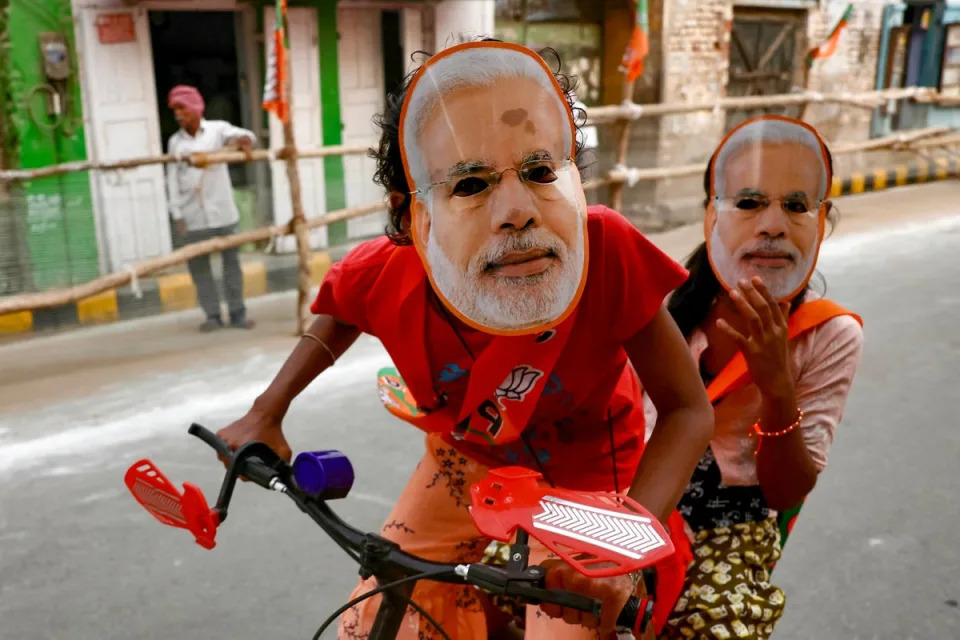
Children riding a bicycle wear masks portraying Narendra Modi in Varanasi (AFP)
Facing relentless criticism from the government benches that Congress exists as a party only to further the ambitions of one family, in 2022 the party held an election to appoint a president from outside the party’s ranks. Among those running were Shashi Tharoor, a former high-ranking UN official and author popular with Indian liberals and young people. In the end the party chose Mallikarjun Kharge, a Gandhi loyalist who Mr Srinivasaraju describes as no more than a “rubber stamp” for the family.
“Why didn’t you, in the last 10 years, focus [on rebuilding the party] after your first loss in 2014?” he asks the Gandhis. “Why didn’t you spend that energy building the infrastructure and network for your party? You did not focus on that, you just placed it on one side. You thought you will come back by default again.”
Sun, June 2, 2024
INDEPENDENT UK

Left to right: Priyanka Gandhi-Vadra, Sonia Gandhi and Rahul Gandhi at an election campaign rally in Rae Bareli (Reuters)
A ripple of excitement spreads through the crowd waiting outside in the 40C midday heat in this corner of Uttar Pradesh, northern India – an island in a sea of constituencies supporting Narendra Modi’s BJP.
“Rahul-ji’s helicopter has come!”, announces an audience member, not long before campaign songs start to blare from speakers and Rahul Gandhi, India’s second-most recognisable politician, steps onto the stage.
This was the scene just a couple of weeks ago in one of the last bastions of fervent support for the Gandhi-Nehru family, one of the world’s great political dynasties whose members include three Indian prime ministers. Among them is Rahul Gandhi’s great-grandfather, the first and longest-serving leader of independent India, Jawaharlal Nehru.
Yet India has changed dramatically since the time when Nehru led the Congress party, with Saturday’s exit polls indicating that Mr Modi’s Hindu nationalist alliance will take more than 350 parliamentary seats when the full results of the country’s general election are announced on Tuesday.
Congress and its allies are forecast to win barely a third of that number, making it a third election in a row where India’s grand old party has desperately underperformed. They say the BJP’s widespread abuse of government investigative agencies to harass opposition leaders and parties, including a total freeze on Congress’s bank accounts, mean this election has been neither free nor fair.
But it is also significant that cracks were already starting to show even in Rae Bareli and Amethi, two neighbouring constituencies in Uttar Pradesh that were once the safest of seats for Congress, when The Independent visited last month. For years the Rae Bareli seat was represented by Sonia Gandhi, former Congress president and wife of the assassinated former prime minister Rajiv Gandhi. She has stepped aside for a seat in India’s upper house of parliament, leaving her son Rahul to take over the constituency, and poor exit poll numbers aside, he is still expected to win here.

Rahul Gandhi waves to supporters during an election campaign public meeting in Rae Bareli (AFP)
While support for the Gandhis still seemed strong in Rae Bareli, voters in Amethi told The Independent they were questioning what Congress has to offer them given its weakened status across the country, and whether five years with a Congress MP would really make for positive change in a relatively rural and impoverished region. It gets to the heart of a question that will be picked over in the weeks to come – did Congress run an effective and positive campaign, or focus too much energy on trying to paint Modi as India’s bogeyman? And what does yet another election loss say about the future of a family that has ruled India for more than half of the last 77 years?
When Mr Gandhi does take to the stage, he is quick to go on the attack. “This election is the strangest one in the history of independent India,” he begins. “Because the BJP and [its ideological parent organisation] RSS are fighting the elections to obliterate the constitution. Their leaders have clearly said they will change the constitution of India once voted to power.”
Mr Gandhi is referencing concerns that Mr Modi, emboldened in a third term, will try to remove references from the constitution to India being a secular nation, and instead declare it a country for Hindus. Mr Modi has said he has no plans to do this, but it’s a talking point for many die-hard BJP supporters and such fears have hardly been assuaged by an aggressive election campaign full of anti-Muslim rhetoric.

Congress party supporters in Rae Bareli (Reuters)
The Independent spoke with Mr Gandhi’s sister, Priyanka Gandhi-Vadra, who is herself a top party strategist and star campaigner. Asked what Congress had to offer voters at this election, she said: “Our pitch is very simple. Mr Modi’s policies have been extremely, they’ve actually been harmful for the poor of this country, for the farmers, for labourers [and] even for the middle class. Frankly, he has not done anything to strengthen them.
“We are saying that his policies have all been skewed towards three or four of his oligarch friends to whom he seems to be handing everything, even the nation’s assets,” she says, an apparent reference to Mr Modi’s close ties with billionaire industrialists like Mukesh Ambani and Gautam Adani, the country’s two richest men.
“And we are saying that we want to put in place a government that is focused on solving your problems and focused on strengthening you so that you can face all these problems that have multiplied under Modi’s rule.”

Narendra Modi with Yogi Adityanath, chief minister of Uttar Pradesh, waves to the crowd in Varanasi last month (AFP)
While most would agree that this election has been far from fair for Congress and its allies, the party is also facing criticism for an apparent inability to recover from the landslide losses of 2014 and 2019 and provide a viable alternative to Mr Modi. Sugata Srinivasaraju, journalist and author of a book on Rahul Gandhi, Strange Burdens, suggests the Gandhis have spent too much of the election preparing to defend their own roles in the party in the event that they lose.
“They are creating a ground already to say that the elections may not be so credible after all. That it is possible they are stolen. They are planting doubts with regard to the electoral processes,” he tells The Independent.
“My question is when you spent so much energy on a negative campaign, on berating Modi, you could have spent a part of that energy to positively approach your own party. What have you done concretely to reorganise your party?”

Children riding a bicycle wear masks portraying Narendra Modi in Varanasi (AFP)
Facing relentless criticism from the government benches that Congress exists as a party only to further the ambitions of one family, in 2022 the party held an election to appoint a president from outside the party’s ranks. Among those running were Shashi Tharoor, a former high-ranking UN official and author popular with Indian liberals and young people. In the end the party chose Mallikarjun Kharge, a Gandhi loyalist who Mr Srinivasaraju describes as no more than a “rubber stamp” for the family.
“Why didn’t you, in the last 10 years, focus [on rebuilding the party] after your first loss in 2014?” he asks the Gandhis. “Why didn’t you spend that energy building the infrastructure and network for your party? You did not focus on that, you just placed it on one side. You thought you will come back by default again.”
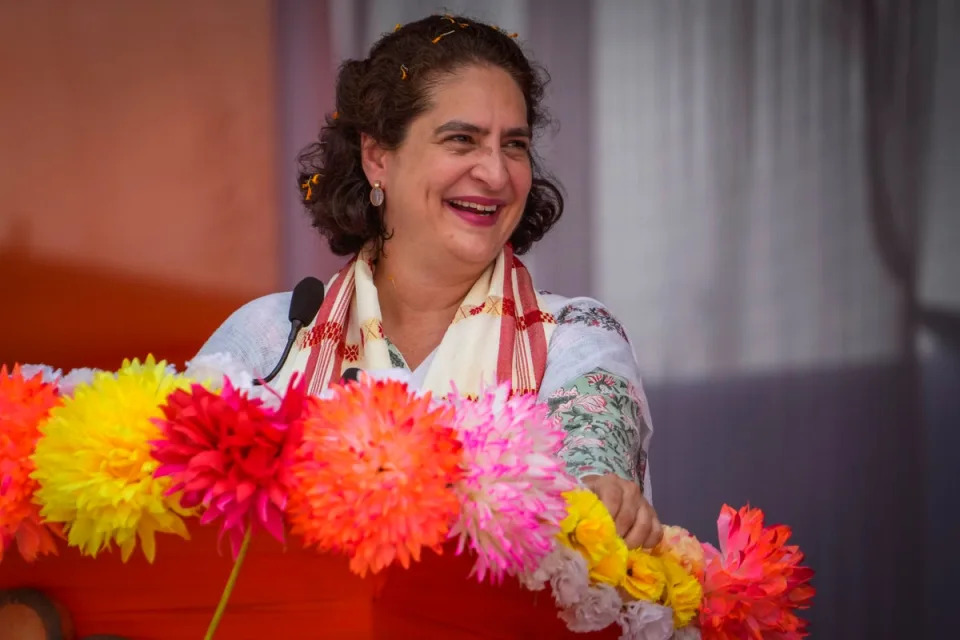
Congress party leader Priyanka Gandhi-Vadra at an election rally in Dhubri district in lower Assam (AP)
There are a host of reasons given by voters in Amethi for why they are turning their backs on the Gandhis, and these range from the local to the religious.
Several cite Mr Modi’s inauguration of a temple to Lord Ram in Ayodhya, also in Uttar Pradesh, as a moment of pride for them as Hindus. With the Ram Temple’s first phase hastily built in time for Mr Modi to declare it open just before the election, it was another moment of history in the country’s lurch towards Hindu nationalism, with the prime minister acting as high priest at a grand monument to Hinduism’s most important deity – on the site of an illegally demolished mosque.
Awadh Prasad Patel, who sings holy songs at religious gatherings, vows to vote for Mr Modi, saying members of his caste support the party. “Only Muslims and a few Dalits [formerly Untouchables] might vote for Congress,” he says. “I am a farmer and a follower of deity Lord Ram. And Modi put an end to the issue of Ram temple. So we would be voting for them.”
“For the longest time, there was no road here. Just potholes,” Chotey Lal Sahu, a 65-year-old from Berara, a village in the Amethi constituency, tells The Independent. “It was filled with water (during the rainy season). But now there is a road. Its construction has eased things for us,” he says.
“Under this government, we are getting ration, we are getting pension. This is the first time the country has a vegetarian prime minister, as well as a vegetarian chief minister,” he added, referring to the firebrand local BJP leader in the state, chief minister Yogi Adityanath.
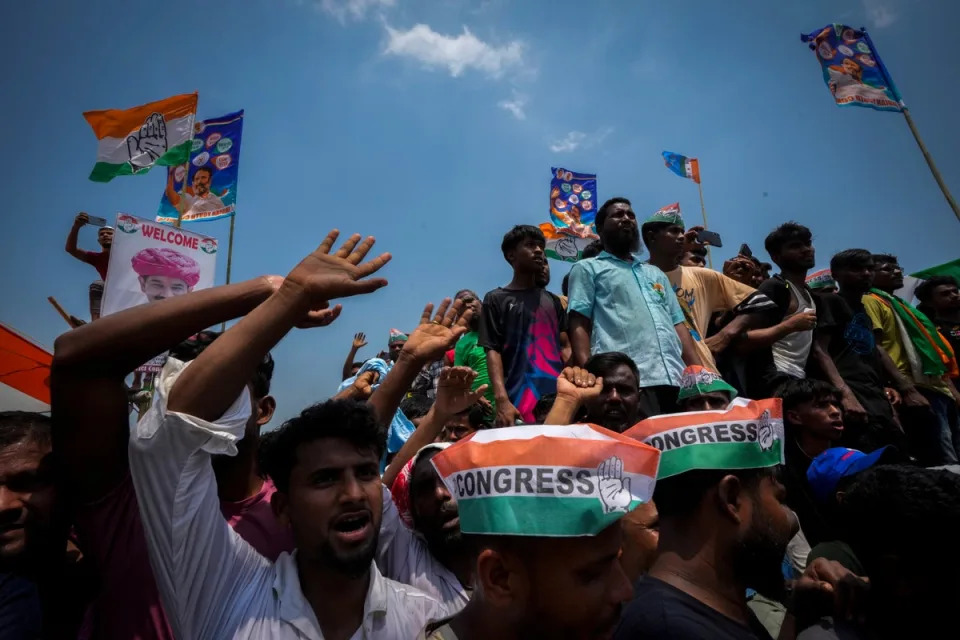
A Congress party rally in Dhubri district (AP)
Ram Shankar, from Tiloi in Amethi, vociferously backs the BJP. “Rahul gave us a lot. But Thakurs [upper caste men] have taken everything. From land to grazing area to pond. There is nothing left.
“I raised a complaint about waste pipe leaking but the police came and beat me. They also beat my father,” he says. “I will vote for the BJP. At least they give money to farmers and have waived off some of my loans.
“I do not care what Rahul Gandhi or his family did, as I was not there. We will only vote for those who will fight for our rights. There is no road, it is just mud. People s*** on the roadside. And our head of village never visits us.”

Modi at a rally in New Delhi (Reuters)
Issues relating to caste and religious politics are powerful tools to sway voters here in Uttar Pradesh, and Congress has been seen as largely reactive in its response to the way Hindutva [Hindu-first] policies have won waves of support for Mr Modi’s party. For a time Congress was accused of doing “soft Hindutva”, showing Gandhi touring Hindu temples as a way of saying the party could still appeal to the religious group that makes up around 80 per cent of the population.
But more recently the party has realised it will never win back the die-hard Hindu nationalists that make up the BJP’s base, Mr Srinivasaraju says, and it is instead “trying to present the Congress as a complete opposite to the philosophy of the BJP”.
“[Gandhi] started speaking about federalism and balkanised caste politics, which was in contrast to the centralised and pan-Indian imagination the Congress was known for not so long ago. He started saying that India was a union of states and not exactly a nation,” he says. “I think Rahul Gandhi is trying to occupy a kind of high moral ground because there is nothing else left.”
Many will question whether Congress picked the right strategies for this election if the results on Tuesday go in line with what the exit polls are saying. But whatever reckoning is due, it seems certain that the party’s first response will be to publicly question the fairness of the world’s largest election.

Rahul Gandhi greets his supporters as he arrives at Fursatganj airport in Amethi last month (AFP)
“It’s the first, possibly the first election in the history of India, where chief ministers from opposition parties have been imprisoned during election time,” says Ms Gandhi-Vadra, as she highlights the challenges faced by the opposition. “There has been a massive attack on opposition leaders in India. Not just opposition leaders, but on free and fair media. So there’s hardly any journalists now who will take an independent stand. The ones who did have either been imprisoned or cases have been put against them.
“On every front, whether it’s activists, journalists, political parties or movie stars who have raised their voices. On every front, the government has attacked them.” The harsh reality for the Gandhi family and its party is that it has had no real defence against the onslaught it has faced from the man now set to become the first after Nehru to win three terms as India’s prime minister.
The Mystery of Indira Gandhi's assassination by her own bodyguards
Breana Scheckwitz
Updated May 23, 2024

The Mystery of Indira Gandhi's assassination by her own bodyguards
Indira Gandhi, a prominent Indian politician and the daughter of Jawaharlal Nehru, India's inaugural prime minister, was tragically assassinated by her own bodyguards on Oct. 31, 1984.
Born Nov. 19, 1917, she emerged as a central figure in her country's political landscape, eventually becoming prime minister in her father's footsteps.
The trust she placed in her favorite Sikh security guard, following Operation Blue Star, ultimately proved to be a fatal mistake. In exploring the narrative of Gandhi's assassination, it is crucial to examine the backgrounds and motivations of her assailants, shedding light on the reasons that led to their fatal decision.
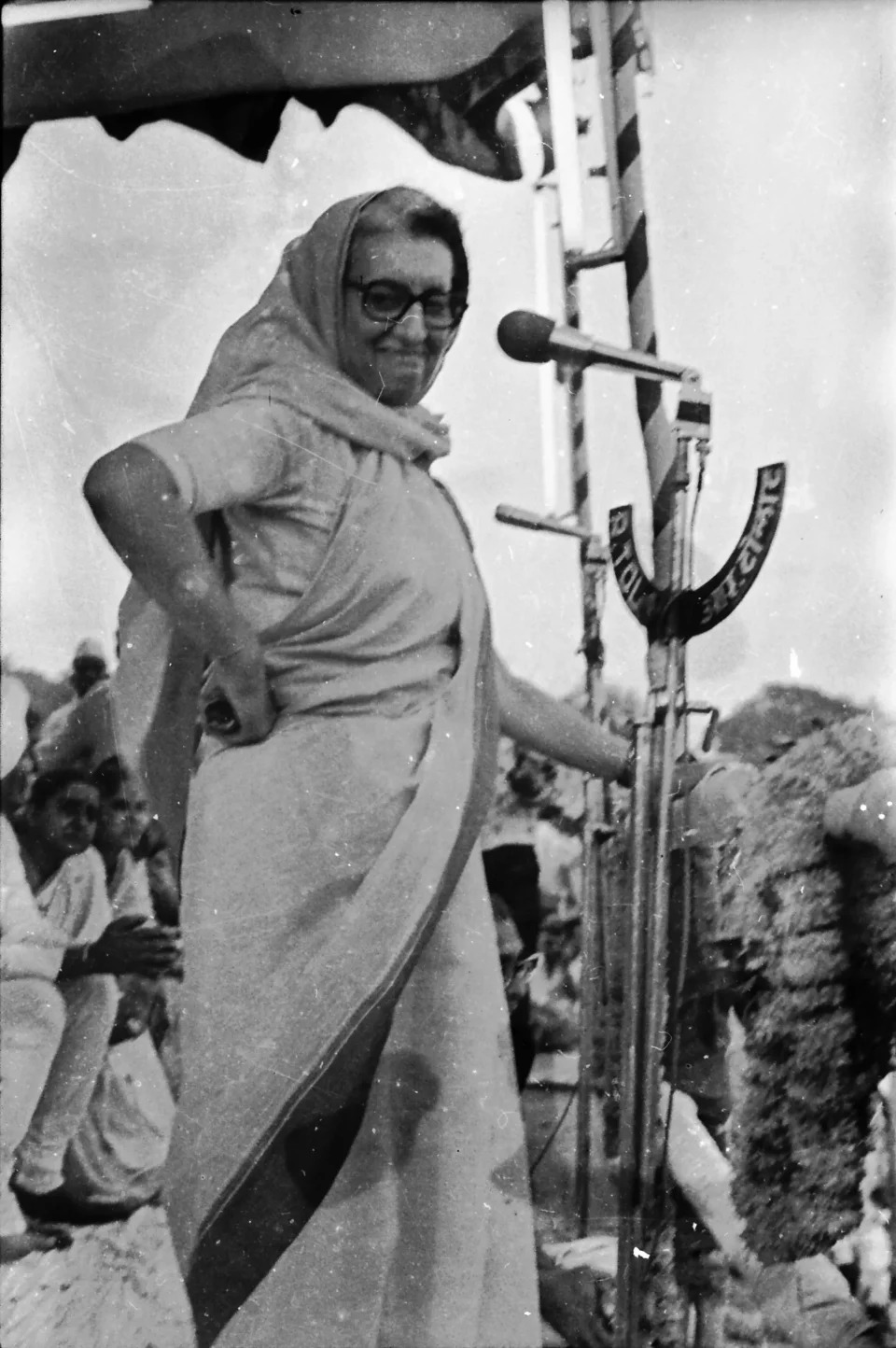
Prior to her time in office, Indira Gandhi studied at prominent institutions, including Somerville College, Oxford and the Visva-Bharati University in West Bengal.
Gandhi served as her country's third and only female prime minister starting in 1966 to 1977, and then served another term from 1980 until she died in 1984.
As a central figure of the Indian National Congress, she was admired for her leadership and criticized for her authoritarian approach. She played a significant role in Indian politics and is often cited as a trailblazer for women throughout the country.
Gandhi was a key player in Indian politics for 17 years, whether in office or out of it. She played an active role in the Independence movement and closely worked with her father, Jawaharlal Nehru, a pivotal figure in the establishment of contemporary India, serving as his assistant when he was prime minister. In 1959, she also held the position of president of the Indian National Congress.

Indira Gandhi's tenure has been characterized by significant economic and social changes, but also by allegations of authoritarianism.
Gandhi rose to power suddenly after Lal Bahadur Shastri died in 1966. At the outset of her leadership, India struggled with significant economic hardships, including high inflation and food shortages. The country's agricultural sector was vulnerable due to its dependence on the monsoon seasons and aid from the U.S.
She also faced substantial political challenges and dedicated much of her tenure to overcoming these issues, the same issues Nehru attempted to resolve. She fought to direct India toward self-reliance and economic resilience. By 1980, India had become self-reliant and even became a nation of grain surplus, alongside notable industrial progress — achievements attributed to her governance.

Indira Gandhi's involvement in politics began at an early age, often accompanying her father on his political campaigns.
Acknowledged milestones during her leadership include the triumph in the 1971 War with Pakistan, the formation of Bangladesh and the cementing of India's status as a potential nuclear power. All of these developments strengthened India's self-esteem.
Her tenure ended with her assassination, leaving behind a legacy of achievements and unresolved tensions.
Indian society was divided about her; some called her "Mother Indira," and others viewed her as authoritarian. However, it is widely accepted that her leadership shaped India and set the course for its future.

Indira Gandhi was assassinated by her own Sikh bodyguards on Oct. 31, 1984, following the events of Operation Blue Star.
Gandhi's time as prime minister was impaired by increasing tensions with Sikh separatists, culminating in Operation Blue Star. This was the Indian army's response in June 1984 to remove militant Sikh leader Jarnail Singh Bhindranwale and his followers, who had hidden themselves within the Golden Temple in Amritsar. The militants' substantial armaments led to a heavy-handed military response, which included the use of artillery.
The conflict ended on June 10 with the army seizing control of the temple. However, the operation, which coincided with a significant Sikh religious event, resulted in numerous civilian deaths who were present at the time. This resulted in widespread condemnation from Sikhs globally. They interpreted it as an attack on their religious community.

Indira Gandhi served as prime minister of India for three consecutive terms (1966-77) and a fourth term from 1980 until her assassination in 1984.
The repercussions of Operation Blue Star severely damaged Gandhi's standing with Sikhs, which eventually led to her assassination.
Gandhi's assassination on Oct. 31, 1984, was committed by her bodyguards, notably Beant Singh, who was considered a favorite. The assassination was a consequence of the tensions from Operation Blue Star and led to a planned reassignment of Sikh bodyguards, including Singh. Gandhi canceled the transfer, worried about increasing her anti-Sikh persona.

Indira Gandi married Feroze Gandhi in 1942, and together had two sons, Rajiv Gandhi and Sanjay Gandhi.
On the morning of her assassination, despite being advised to wear a bulletproof vest, Gandhi was not wearing it.
As she walked through a gate headed to an interview, Singh shot her three times in the abdomen with his .38 revolver. Satwant Singh, another bodyguard, fired 30 rounds from his submachine gun. Following the assault, Beant was located and killed by Border Police, and Satwant was tried and executed in 1989.
Indira Gandhi’s son, Rajiv Gandhi, succeeded her as prime minister of India.
Breana Scheckwitz
Updated May 23, 2024

The Mystery of Indira Gandhi's assassination by her own bodyguards
Indira Gandhi, a prominent Indian politician and the daughter of Jawaharlal Nehru, India's inaugural prime minister, was tragically assassinated by her own bodyguards on Oct. 31, 1984.
Born Nov. 19, 1917, she emerged as a central figure in her country's political landscape, eventually becoming prime minister in her father's footsteps.
The trust she placed in her favorite Sikh security guard, following Operation Blue Star, ultimately proved to be a fatal mistake. In exploring the narrative of Gandhi's assassination, it is crucial to examine the backgrounds and motivations of her assailants, shedding light on the reasons that led to their fatal decision.

Prior to her time in office, Indira Gandhi studied at prominent institutions, including Somerville College, Oxford and the Visva-Bharati University in West Bengal.
Gandhi served as her country's third and only female prime minister starting in 1966 to 1977, and then served another term from 1980 until she died in 1984.
As a central figure of the Indian National Congress, she was admired for her leadership and criticized for her authoritarian approach. She played a significant role in Indian politics and is often cited as a trailblazer for women throughout the country.
Gandhi was a key player in Indian politics for 17 years, whether in office or out of it. She played an active role in the Independence movement and closely worked with her father, Jawaharlal Nehru, a pivotal figure in the establishment of contemporary India, serving as his assistant when he was prime minister. In 1959, she also held the position of president of the Indian National Congress.

Indira Gandhi's tenure has been characterized by significant economic and social changes, but also by allegations of authoritarianism.
Gandhi rose to power suddenly after Lal Bahadur Shastri died in 1966. At the outset of her leadership, India struggled with significant economic hardships, including high inflation and food shortages. The country's agricultural sector was vulnerable due to its dependence on the monsoon seasons and aid from the U.S.
She also faced substantial political challenges and dedicated much of her tenure to overcoming these issues, the same issues Nehru attempted to resolve. She fought to direct India toward self-reliance and economic resilience. By 1980, India had become self-reliant and even became a nation of grain surplus, alongside notable industrial progress — achievements attributed to her governance.

Indira Gandhi's involvement in politics began at an early age, often accompanying her father on his political campaigns.
Acknowledged milestones during her leadership include the triumph in the 1971 War with Pakistan, the formation of Bangladesh and the cementing of India's status as a potential nuclear power. All of these developments strengthened India's self-esteem.
Her tenure ended with her assassination, leaving behind a legacy of achievements and unresolved tensions.
Indian society was divided about her; some called her "Mother Indira," and others viewed her as authoritarian. However, it is widely accepted that her leadership shaped India and set the course for its future.

Indira Gandhi was assassinated by her own Sikh bodyguards on Oct. 31, 1984, following the events of Operation Blue Star.
Gandhi's time as prime minister was impaired by increasing tensions with Sikh separatists, culminating in Operation Blue Star. This was the Indian army's response in June 1984 to remove militant Sikh leader Jarnail Singh Bhindranwale and his followers, who had hidden themselves within the Golden Temple in Amritsar. The militants' substantial armaments led to a heavy-handed military response, which included the use of artillery.
The conflict ended on June 10 with the army seizing control of the temple. However, the operation, which coincided with a significant Sikh religious event, resulted in numerous civilian deaths who were present at the time. This resulted in widespread condemnation from Sikhs globally. They interpreted it as an attack on their religious community.

Indira Gandhi served as prime minister of India for three consecutive terms (1966-77) and a fourth term from 1980 until her assassination in 1984.
The repercussions of Operation Blue Star severely damaged Gandhi's standing with Sikhs, which eventually led to her assassination.
Gandhi's assassination on Oct. 31, 1984, was committed by her bodyguards, notably Beant Singh, who was considered a favorite. The assassination was a consequence of the tensions from Operation Blue Star and led to a planned reassignment of Sikh bodyguards, including Singh. Gandhi canceled the transfer, worried about increasing her anti-Sikh persona.

Indira Gandi married Feroze Gandhi in 1942, and together had two sons, Rajiv Gandhi and Sanjay Gandhi.
On the morning of her assassination, despite being advised to wear a bulletproof vest, Gandhi was not wearing it.
As she walked through a gate headed to an interview, Singh shot her three times in the abdomen with his .38 revolver. Satwant Singh, another bodyguard, fired 30 rounds from his submachine gun. Following the assault, Beant was located and killed by Border Police, and Satwant was tried and executed in 1989.
Indira Gandhi’s son, Rajiv Gandhi, succeeded her as prime minister of India.
No comments:
Post a Comment